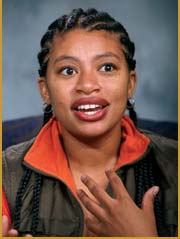| |
|
| |
|
|||||||

|
Tyina Steptoe knew a lot about the civil-rights movement from her classes and readings. But a UW-Madison class called Freedom Ride 2001 offered Steptoe and 34 other students an extraordinary learning opportunity — a firsthand look at the people and places involved in the movement."It was much more powerful to walk through a street or park where events of the movement took place than to read about them in a book," Steptoe says. The three-week course took students to places like Selma, Alabama, where police beat hundreds of African-Americans as they protested for their right to vote; New Orleans, where students toured the sites of plantations and slave auctions; and Clarksdale, Mississippi, where Steptoe saw how far the civil-rights movement still has to go. While eating in a small restaurant in Clarksdale, Steptoe and her classmates felt the strong presence of a large Confederate flag that decorated one wall, as well as animosity from some of the patrons. At that moment, she began to feel that she was part of a continuing civil-rights movement. "I felt proud of what previous generations had accomplished as that owner took my order and served my lunch while people were giving me dirty looks," Steptoe says. During a plantation tour, students peppered a tour guide with questions about the role of slavery, only to find that it was a topic the guides were hoping to avoid. "I realize now how horribly history is being represented in some places," Steptoe says. "I want the truth to be told, not just for personal reasons, but also from a scholarly perspective." On the way home, each student was asked to tell the group what they planned to do with what they had learned. Steptoe said she wanted to share her experiences with others. "On paper, many will say the civil-rights movement ended in 1965 with the Voting Rights Act," Steptoe says. "Now I wonder whether it is even close to actually being over." She recently helped form a group called Teaching Racial Understanding Through History, or TRUTH, which visits local high schools and talks to students about the civil-rights movement. She has decided to pursue a doctoral degree in Afro-American history — a life goal she was unsure of before the trip — hoping to one day become a faculty member at a university.
|
||||||
|
"One of the ways UW-Madison is strengthening its preeminence as an institution of higher education is by expanding learning opportunities for our students, the faculty and staff, and the entire community. We combine outstanding classroom instruction with innovative new programs designed to connect students with faculty research and creative work, expand the learning experience into residence halls and across campus, and provide opportunities for lifelong learning. We graduate educated and enlightened citizens who can better contribute to our society." — Peter Spear, Provost
|
During an adaptive sports and fitness class, kinesiology students learn techniques for meeting the fitness needs of people with physical disabilities.
|
||||||
|
|
|
|